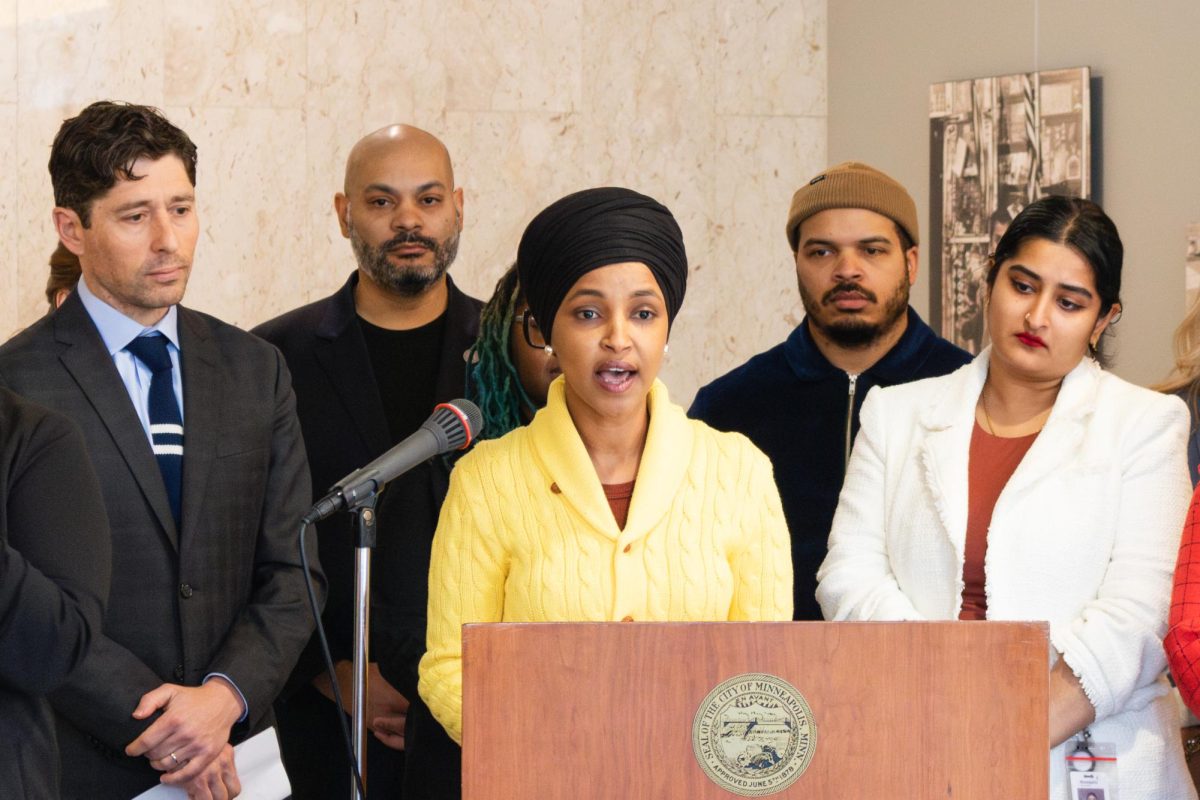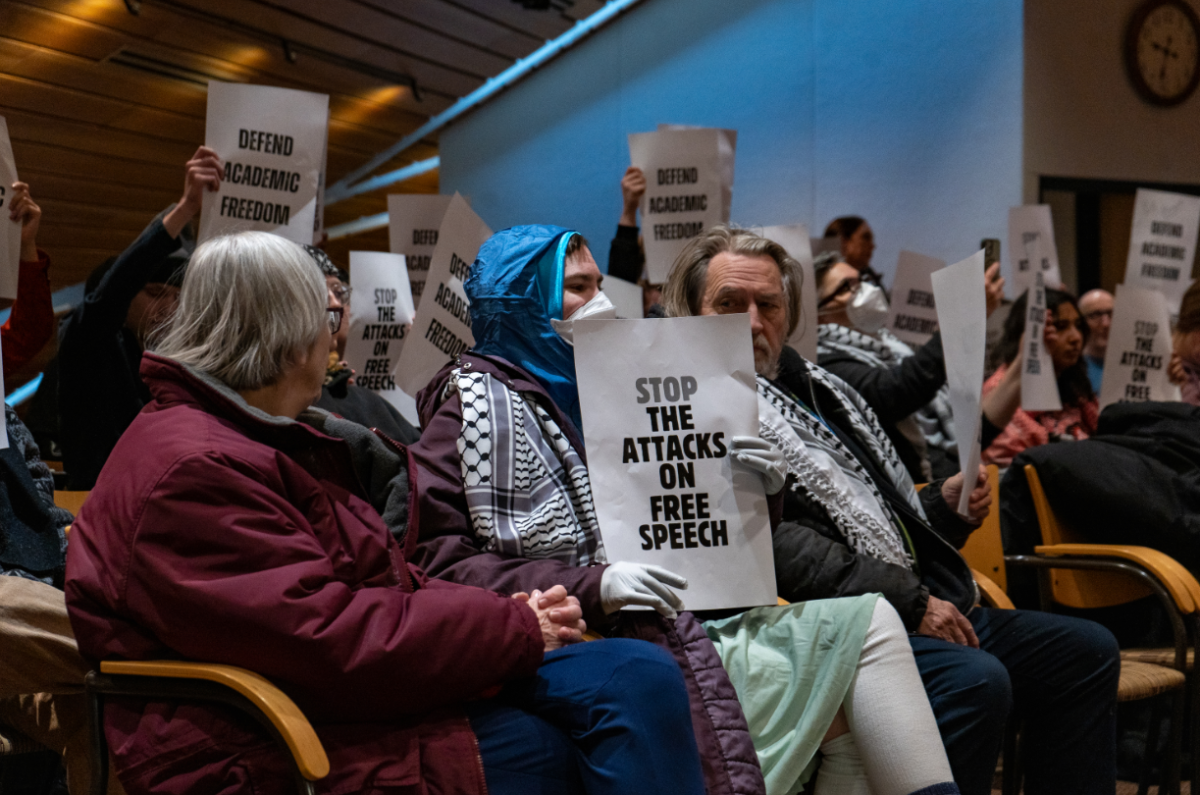As President Donald Trump’s administration makes immigration changes, Rep. Ilhan Omar (D-Minn.) and the Minneapolis City Council voiced their support for limiting the president’s authority to deport immigrants.
The City Council and Omar called on Congress to move forward with the Neighbors Not Enemies Act which Omar introduced with Sen Mazie Hirono (D-Hawaii). The Neighbors Not Enemies Act would repeal the current Enemies Act of 1798 which allows the president to deport immigrants based on their nationality during times of war or invasion without a hearing.
At a press conference meeting on Jan. 28, Omar said the act is unconstitutional and harmful to the immigrants who come to the U.S.
“We need to be clear about what this will mean for human beings in this country,” Omar said in the press conference. “Thousands of families will have their lives upended because of Donald Trump’s actions. It is important to recognize that this will not happen because of anything they have done but where they were born.”
City Council members and Minneapolis Mayor Jacob Frey echoed her sentiments at the press conference.
“This alien enemy’s act is archaic, it’s wrong-headed, it allows for people to be detained and deported,” Frey said in the press conference. “It runs against our values in Minnesota. It is an act that should have long been repealed.”
According to Eric Schwartz, a University of Minnesota professor in Global Policy, the Alien Enemies Act of 1798 was used during the World Wars to deport citizens from nations the U.S. was at war with.
While the president can not declare war without the approval of Congress, law centers like the Brennan Law Society argue that “invasion” and “predatory incursion” can be left up to interpretation which would allow the president to use the authority whenever.
“The President could interpret these terms very, very broadly to argue,” Schwartz said. “Perhaps the passage of fentanyl into the United States could constitute that kind of incursion or if there were non-state actors in other countries, they could be seen as effectively the equivalent.”
In Trump’s first two weeks in office, he has changed several policies around deportations, visas, and Immigration and Customs Enforcement (ICE).
ICE officers are now allowed to enter “sensitive” areas like churches and schools.
“We are seeing several community members who are very concerned about raids at their school or at their employer,” Colleen Riley, an immigration paralegal at the Minnesota Immigrants Rights Committee said.
Council Member Aurin Chowdhury (Ward 12), the daughter of Bengali immigrants, said Trump’s new immigration policies are personal to her.
“This is just one action we are taking as a council and we are exploring what else can be done to strengthen the local legislation we currently have in place and how we as a council can support and amplify the Office of Immigrant and Refugee Affairs which is providing a local level touch point for immigrants to connect with the City,” Chowdhury said in a statement.
Even with that, Schwartz said with the Republican majority in the U.S. House and Senate, the bill is unlikely to go through. Schwartz said that Minnesota will still play an important role in immigration discussion as the Trump presidency continues.
“I think Minnesota officials will have to ensure that they’re in compliance with federal law, but having said that, they have considerable avenues to continue to promote the values and the objectives that animate our public life in Minnesota, support for inclusion, support for immigrants and refugees,” Schwartz said.
Chowdhury said anyone with concerns or questions about immigration should reach out to Minneapolis Immigrant and Refugee Affairs.





















Rick Person
Feb 7, 2025 at 9:11 am
I would just like to say as a life long Minnesotan that these people do not share my values at all.
ROBERT A. YEZEK
Feb 7, 2025 at 8:25 am
Again, not listening to their voters. We don’t want them here. Illegally legally is fine and Omar knows nothing of what she speaks. She’d rather have America die than protect the people that live in it
LostonCampus
Feb 6, 2025 at 11:39 am
” for limiting the president’s authority to deport immigrants.”
Except THEY CANT- What Fools
Joe Boller
Feb 6, 2025 at 8:47 am
It’s interesting that Aurin Chowdery sp my council member speaks up only when the situation affects her. I have written her emails about citizens safety regarding no 3rd precinct and she must throw those in the round file because she refuses to answer the legitimate questions of her constituents. She moved into our district when she knew of an opportunity for her advancement when our former council member Andrew Johnson wasn’t going to run for the position. In my opinion that makes her a carpet bagger, hmmm just like our mayor.
Deport lawbreakers
Feb 6, 2025 at 8:45 am
What happened to “nobody is above the law”? By entering the US illegally, they have violated US law. The current Administration is not playing around. Officials that obstruct Federal enforcers are at risk of being detained. Let Omar be first among them.